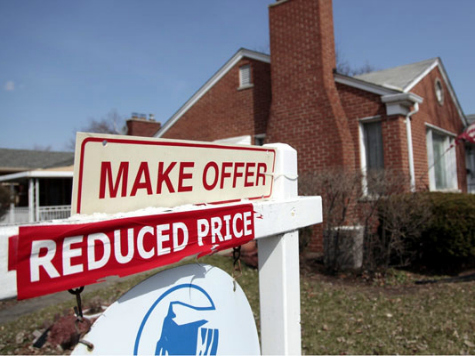
The latest economic indicators continue to suggest that the housing market is slowing due to the twin evils of the Dodd-Frank Wall Street Reform law and the Fed’s low interest rate policies.
The former has greatly constricted the availability of credit to millions of American consumers. The latter is taking hundreds of billions of dollars per year from savers, individuals and corporations alike, fueling the already dangerous deflationary tendency which still hangs over the US.
The 2010 Dodd-Frank law has imposed the most draconian regulation on the US financial markets since existed during the Great Depression. Liberals such as the law’s co-authors, former Reps. Barney Frank (D-MA) and Christopher Dodd (D-CT), pretend that the law is about protecting consumers. However, the only thing that Dodd-Frank is doing is protecting American families from buying a home.
Dodd-Frank restricts the types of loans that American banks and non-banks are allowed to offer consumers. The law also outlaws pre-payment penalties, effectively freezing lower-income borrowers out of the mortgage loan market. Unless lenders can protect themselves against a below-prime borrower’s prepaying a home loan in the first couple of years, there is no incentive to make the loan in the first place.
The new rules put in place by the Consumer Finance Protection Bureau (CFPB) also effectively outlaw many floating rate mortgages. This fact is having a terribly negative impact on the housing market, especially as the Federal Open Market Committee gradually moves interest rates to more normal levels. The fact that consumers cannot access adjustable rate mortgages works to reduce demand for home loans.
My friend and colleague Sam Khater at CoreLogic describes the impact of the Dodd-Frank regulatory regime compared with the period before 2010:
The difference between today’s market and those eras is that in the past borrowers would often switch to more affordable ARM products, many of which today are less available. The December drop in applications reveals that purchase market today is more sensitive to a rise in 30-year FRM rates than in prior years because borrowers are less able to switch to more affordable products.
Khater also notes that the weak job market is another possible explanation for the low demand for home purchases. However, again, as we have discussed extensively in Washington & Wall Street, the fact of the Fed’s punitive interest rate policy, which punishes savers and investors and subsidizes debtors, is an enormous negative hanging over the employment market. Just ask the tens of thousands of realtors and mortgage professionals who have lost their jobs in the past year thanks to the weak housing market.
Julie Steinberg of The Wall Street Journal reported back in October that the layoffs in the mortgage sector are affecting both front office loan production staff as well as back office loan servicing and processing personnel:
The cutbacks at the nation’s biggest banks, while not as dramatic or far-reaching as those that took place after the 2008 crisis, often have affected people who work far away from the pinstriped suits of Wall Street.
Inside Mortgage Finance, one of the most important publications in the housing sector, has cataloged literally tens of thousands of layoffs by banks and non-banks alike over the past year. One telling data point is that the issuance of new mortgage securities has fallen by more than a third between Q3 2013 and Q4 of last year. In December the publication outlined what we can expect in 2014:
With residential originations expected to fall by 25 percent next year, some mortgage executives are predicting grim news in terms of new hiring, especially in any field tied to loan production. But as always, there are always a few “silver linings” in any downdraft, mortgage banking being no exception to the rule. A handful of firms say they are still aggressively recruiting residential loan officers who have a solid background in purchase-money lending.
Fortunately, the growing pain in the housing sector is starting to be noticed on Capitol Hill, at least by Republicans. The Democrats as a group continue to pretend that the brave new world of Dodd-Frank and the CFPB is a good thing for the American economy, but the hearings held last week before the House Financial Services Committee suggest otherwise. IMF reports, “A lot of prospective homebuyers may be shut out of the market if their mortgage financing can’t pass muster with the Consumer Financial Protection Bureau’s qualified-mortgage standard, congressional testimony this week suggested.”
Bill Emerson, CEO of Quicken Loans, told the hearing that while some of the CFPB’s regulations benefit consumers by requiring lenders to assure that the borrower has the “ability to repay” (ATR), the overall impact of the Dodd-Frank legislation is to reduce the availability of credit:
[W]hile the CFPB has done much to develop these rules – particularly ATR – we remain concerned that they are likely to unduly tighten mortgage credit for a significant number of creditworthy families who seek to buy or refinance a home. Unless there are changes along the lines we suggest in this testimony, these rules may impair credit access for many of the very consumers they are designed to protect.

COMMENTS
Please let us know if you're having issues with commenting.